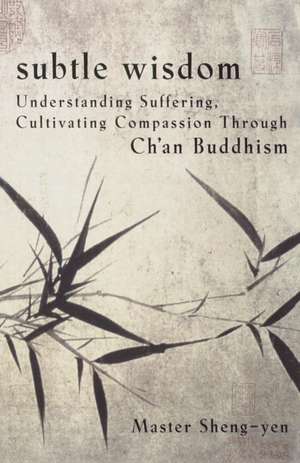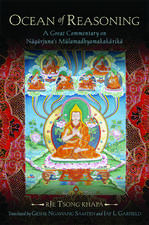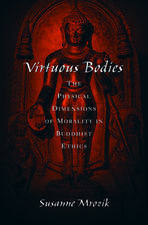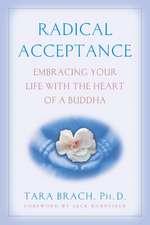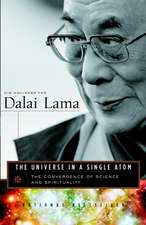Subtle Wisdom
Autor Sheng Yen, Master Sheng Yenen Limba Engleză Paperback – 31 iul 1999
Preț: 96.11 lei
Nou
Puncte Express: 144
Preț estimativ în valută:
18.40€ • 19.99$ • 15.46£
18.40€ • 19.99$ • 15.46£
Carte disponibilă
Livrare economică 31 martie-14 aprilie
Preluare comenzi: 021 569.72.76
Specificații
ISBN-13: 9780385480451
ISBN-10: 0385480458
Pagini: 160
Dimensiuni: 157 x 201 x 11 mm
Greutate: 0.22 kg
Editura: IMAGE
ISBN-10: 0385480458
Pagini: 160
Dimensiuni: 157 x 201 x 11 mm
Greutate: 0.22 kg
Editura: IMAGE
Recenzii
"Ch'an Master Sheng-yen is a great teacher and I have great confidence in his scholarship and wisdom. I feel privileged to be his friend, and admire what he has been doing for the Buddhadharma in the East as well as in the West."
--Thich Nhat Hanh
"When I listen to Master Sheng-yen's presentation of Ch'an Buddhist teachings, my immediate and very profound feeling is that I am listening to words of wisdom from someone who is very experienced and a great practitioner."
--His Holiness, the Dalai Lama
--Thich Nhat Hanh
"When I listen to Master Sheng-yen's presentation of Ch'an Buddhist teachings, my immediate and very profound feeling is that I am listening to words of wisdom from someone who is very experienced and a great practitioner."
--His Holiness, the Dalai Lama
Notă biografică
Master Sheng-yen, a renowned teacher of Ch'an Buddhism, left his home near Shanghai at the age of thirteen to become a monk. During the period of Communist unrest, he fled to southern Taiwan and spent six years in solitary retreat. Later he continued his formal study, earning a doctorate in Buddhist literature from Rissho University in Tokyo. He has also received Dharma transmission in the two major schools of Ch'an. Sheng-yen now divides his time between New York, where he is the resident teacher at the Ch'an Meditation Center he founded, and Taipei, where he is the abbot of two monasteries.
Extras
Youthful Questioning
I would like to tell you about three events that happened to me when I was young, and that influenced me to follow the Buddhist path. Each of them raised questions about the nature of life.
As a child I was very sickly, and that slowed down my development both physically and educationally. I did not learn how to speak until I was about seven years old, and I did not begin reading until I was nine. I was always quiet, and not terribly bright.
Even though my family was poor, my parents always helped people in need. They were Buddhist in the uneducated folk way of country people. We children were taught an accepting attitude toward life. My father would tell me, "Big ducks go the big duck way, and small ducks go the small duck way, so everyone has his or her own way to go." Beyond lessons such as that, I didn't think about "big" questions until I was about ten years old, when something happened that made me think about the nature of life for the first time.
In the flooded rice fields of the Chinese countryside, there were many water snakes. These snakes are not harmful, since they do not bite people and are not poisonous. No one, not even a child, is afraid of them, even though they can grow quite long. One day I saw a snake over a yard long pursuing a frog about the size of half of one's palm. When the snake had almost caught the frog, the frog turned and faced the snake. The snake also stopped, and darted his tongue out at the frog. Strangely enough, the frog moved toward the mouth of the snake, seeming to offer himself up. The snake snatched up the frog by the head and then gradually swallowed it whole. My first impulse was to save the frog, and I picked up a stick to hit the snake. But then I thought, "The snake needs to eat, just like other animals. To save the frog from the snake would be as if someone took my dinner out of my mouth." In saving the frog I'd be hurting the snake. It didn't seem right to interfere. But even though I had this moment of clarity about what was happening, I did not feel good about the whole thing.
I watched the shape of the frog travel from the mouth of the snake through the throat and into the body. It made a vivid impression. Because I could still see the frog, I wondered, "What happens to the frog? Do the frog and the snake merge into one life? If I were the frog, where would I be now?"
What also confused me was that the frog had clearly been afraid of the snake initially. He tried to escape and obviously did not want to be eaten. Why, then, did the frog finally crawl toward the mouth of the snake and let himself be eaten? I could not figure it out, and it left me deeply puzzled.
That same summer I had a second important experience. It was a busy year! I was in the rice fields with my elder brother, crossing a narrow bridge made of a single log, which were common in the Chinese countryside. A short distance under the bridge was a stream, and in the stream two water buffalo that belonged to a neighboring family were resting after their day's work in the fields. If the buffalo stood up, their heads were above the level of the bridge, but if they lay in the water, they were hidden beneath the bridge. When I crossed the bridge in one direction I did not see them, but when I came back, there they were. Water buffalo are big and might seem intimidating, but people in the countryside are used to them--they are domestic animals--so I was not afraid and started across the bridge. The buffalo looked at me and retreated a bit, but then they got very agitated and started spitting water all over. I had no idea what to make of this! Was it a sign of aggression, or perhaps a sign of welcome? I was frightened and didn't know what to do, and I froze in the middle of the bridge. Standing there, I finally became so terrified that I simply fell off the bridge right onto the head of one of the water buffalo. The buffalo, perhaps just as scared as I was, ducked under the water. Fortunately my elder brother was there and dragged me out.
After I'd had a chance to collect myself, two thoughts occurred to me. First, I observed that my fear of the water buffalo, instead of helping me get away from them, had resulted in my coming into closer contact with them. Were it not for my fear, I would not have fallen off the log. It seemed that something similar had happened to the frog, which, afraid for its life, had fled the snake. It is often true in life that you end up close to what you fear, try as you may to escape it. What you fear is what you must confront. I experienced this understanding as a kind of realization or awakening.
Second, I wondered what would have happened to me if I had died as a result of this accident, just as I had wondered what had happened to the frog. I couldn't figure that out at all. If I had drowned, where would I be? I kept thinking about this but couldn't come up with any answers. Questions about what would happen to me after I died bothered me for a long time after this incident.
As you might expect, I was also afraid of water buffalo for a long time; I suppose you might call it buffalophobia. Much later I understood that the essential reason I was afraid of buffalo was that I was afraid of death. I was afraid of death because I did not know what would happen to me after death. I overcame my fear of buffalo when I finally realized that death is really not a problem.
I would like to tell you about three events that happened to me when I was young, and that influenced me to follow the Buddhist path. Each of them raised questions about the nature of life.
As a child I was very sickly, and that slowed down my development both physically and educationally. I did not learn how to speak until I was about seven years old, and I did not begin reading until I was nine. I was always quiet, and not terribly bright.
Even though my family was poor, my parents always helped people in need. They were Buddhist in the uneducated folk way of country people. We children were taught an accepting attitude toward life. My father would tell me, "Big ducks go the big duck way, and small ducks go the small duck way, so everyone has his or her own way to go." Beyond lessons such as that, I didn't think about "big" questions until I was about ten years old, when something happened that made me think about the nature of life for the first time.
In the flooded rice fields of the Chinese countryside, there were many water snakes. These snakes are not harmful, since they do not bite people and are not poisonous. No one, not even a child, is afraid of them, even though they can grow quite long. One day I saw a snake over a yard long pursuing a frog about the size of half of one's palm. When the snake had almost caught the frog, the frog turned and faced the snake. The snake also stopped, and darted his tongue out at the frog. Strangely enough, the frog moved toward the mouth of the snake, seeming to offer himself up. The snake snatched up the frog by the head and then gradually swallowed it whole. My first impulse was to save the frog, and I picked up a stick to hit the snake. But then I thought, "The snake needs to eat, just like other animals. To save the frog from the snake would be as if someone took my dinner out of my mouth." In saving the frog I'd be hurting the snake. It didn't seem right to interfere. But even though I had this moment of clarity about what was happening, I did not feel good about the whole thing.
I watched the shape of the frog travel from the mouth of the snake through the throat and into the body. It made a vivid impression. Because I could still see the frog, I wondered, "What happens to the frog? Do the frog and the snake merge into one life? If I were the frog, where would I be now?"
What also confused me was that the frog had clearly been afraid of the snake initially. He tried to escape and obviously did not want to be eaten. Why, then, did the frog finally crawl toward the mouth of the snake and let himself be eaten? I could not figure it out, and it left me deeply puzzled.
That same summer I had a second important experience. It was a busy year! I was in the rice fields with my elder brother, crossing a narrow bridge made of a single log, which were common in the Chinese countryside. A short distance under the bridge was a stream, and in the stream two water buffalo that belonged to a neighboring family were resting after their day's work in the fields. If the buffalo stood up, their heads were above the level of the bridge, but if they lay in the water, they were hidden beneath the bridge. When I crossed the bridge in one direction I did not see them, but when I came back, there they were. Water buffalo are big and might seem intimidating, but people in the countryside are used to them--they are domestic animals--so I was not afraid and started across the bridge. The buffalo looked at me and retreated a bit, but then they got very agitated and started spitting water all over. I had no idea what to make of this! Was it a sign of aggression, or perhaps a sign of welcome? I was frightened and didn't know what to do, and I froze in the middle of the bridge. Standing there, I finally became so terrified that I simply fell off the bridge right onto the head of one of the water buffalo. The buffalo, perhaps just as scared as I was, ducked under the water. Fortunately my elder brother was there and dragged me out.
After I'd had a chance to collect myself, two thoughts occurred to me. First, I observed that my fear of the water buffalo, instead of helping me get away from them, had resulted in my coming into closer contact with them. Were it not for my fear, I would not have fallen off the log. It seemed that something similar had happened to the frog, which, afraid for its life, had fled the snake. It is often true in life that you end up close to what you fear, try as you may to escape it. What you fear is what you must confront. I experienced this understanding as a kind of realization or awakening.
Second, I wondered what would have happened to me if I had died as a result of this accident, just as I had wondered what had happened to the frog. I couldn't figure that out at all. If I had drowned, where would I be? I kept thinking about this but couldn't come up with any answers. Questions about what would happen to me after I died bothered me for a long time after this incident.
As you might expect, I was also afraid of water buffalo for a long time; I suppose you might call it buffalophobia. Much later I understood that the essential reason I was afraid of buffalo was that I was afraid of death. I was afraid of death because I did not know what would happen to me after death. I overcame my fear of buffalo when I finally realized that death is really not a problem.
Descriere
A renowned teacher of Ch'an Buddhism provides an introduction to this powerful world of thought--an important exploration perfect for those just coming to Buddhism or those already familiar with the Tibetan and Zen schools.
